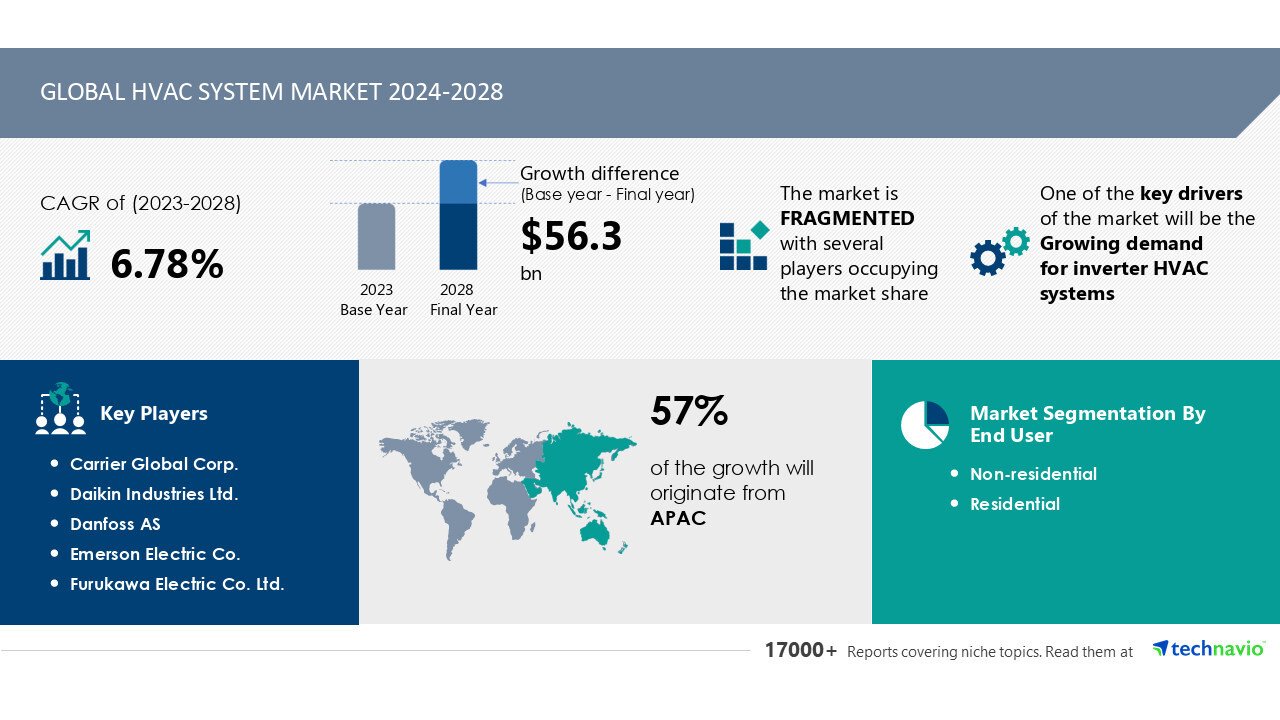Global HVAC System Market Projected to Reach USD 56.3 Billion by 2028
The global HVAC (Heating, Ventilation, and Air Conditioning) system market is forecasted to experience robust growth, expanding by USD 56.3 billion from 2024 to 2028, with a compound annual growth rate (CAGR) of 6.78%. This growth is driven by increasing climatic changes, rising demand for energy-efficient solutions, and the adoption of advanced technologies, including AI-driven innovations, to meet modern climate control needs across residential, commercial, and industrial sectors.
Market Trends and Drivers
The HVAC market is evolving rapidly due to technological advancements and changing consumer demands:
- Smart HVAC Systems: The popularity of connected and IoT-enabled HVAC systems is on the rise, allowing users to monitor and manage energy consumption efficiently. These systems provide advanced indoor air quality solutions through air filters, UV-C sterilization, and predictive maintenance.
- Energy Efficiency and Sustainability: Governments worldwide are implementing regulations to phase out hydrofluoroolefins (HFOs) and promote eco-friendly HVAC systems. Hybrid heating systems, green technologies, and machine learning systems are at the forefront of innovation, ensuring compliance with environmental standards and reducing energy costs.
- Urbanization and Infrastructure Growth: Increasing urbanization, industrialization, and housing projects in emerging markets are fueling the demand for advanced HVAC solutions. Key applications include affordable housing units, medical facilities, and large-scale commercial buildings.
Segment Insights
-
End-User
- Non-Residential: This segment dominates the market, driven by the expansion of commercial and industrial infrastructure. Investments in office spaces, airports, and co-working facilities are expected to sustain this growth. For instance, India's plan to construct 220 new airports by 2025 is a significant driver of demand for centralized split air conditioners.
- Residential: The residential sector is also witnessing growth due to rising demand for energy-efficient and compact HVAC systems.
-
Type
- Split Systems: Preferred for their efficiency and compact design, split systems continue to gain traction across various applications.
- Ductless and Packaged Systems: These systems are popular for retrofitting existing buildings and addressing specific climate control needs.
-
Geography
- Asia-Pacific (APAC): This region leads the global HVAC market due to rapid urbanization and robust construction activity in countries like China, India, and Japan.
- Europe and North America: These regions are focusing on green building strategies and sustainability, driving the adoption of advanced HVAC technologies.
Challenges and Opportunities
Despite strong growth, the HVAC industry faces challenges, including:
- Labor Shortages: A lack of skilled technicians for installation and maintenance is impacting aftermarket services and operational efficiency.
- High Initial Costs: Advanced systems, such as hybrid heating and IoT-enabled devices, require significant upfront investment, which can deter adoption among smaller businesses.
However, these challenges also present opportunities for innovation. Companies are investing in training programs and automation technologies to mitigate labor shortages and streamline operations.
Key Players in the Market
Prominent companies shaping the HVAC landscape include Carrier Global Corp., Daikin Industries Ltd., Danfoss AS, Johnson Controls International Plc., Lennox International Inc., Mitsubishi Electric Corp., LG Electronics Inc., Trane Technologies Plc, and Whirlpool Corp. These organizations are leveraging strategic partnerships, mergers, and new product launches to enhance their market presence.
Research Highlights
The comprehensive research by Technavio emphasizes AI-driven innovations reshaping competitive dynamics in the HVAC market. Predictive maintenance, energy optimization, and advanced analytics are driving the adoption of smart HVAC systems, making them an integral part of sustainable infrastructure development.
Conclusion
The HVAC system market is poised for transformative growth, driven by advancements in technology, rising environmental concerns, and increasing demand for energy-efficient solutions. With continued investments in smart systems and green technologies, the HVAC industry is set to play a pivotal role in building a sustainable and energy-efficient future.
